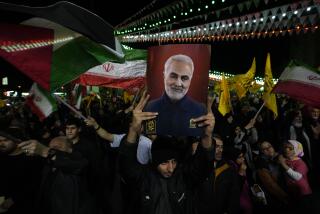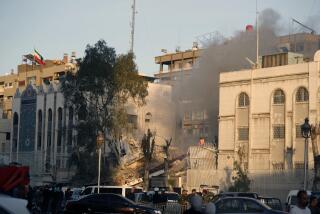Syria opposition threatens to pull out of talks after U.N. invites Iran
BEIRUT -- A furor has erupted about the United Nations’ decision to invite Iran -- a staunch backer of Syrian President Bashar Assad -- to a long-anticipated Syrian peace conference scheduled to begin Wednesday in Switzerland.
The main U.S.-backed exiled opposition umbrella group, the Syrian National Coalition, has threatened to withdraw from the talks unless Sunday’s invitation to Iran was retracted. The United States has also objected to Iran’s prospective participation.
The threat of a pullout from the opposition bloc came less than 48 hours after the deeply divided coalition voted on Saturday to attend the conference. That decision came despite objections from many opposition factions who view the process as a betrayal of the uprising against Assad’s government.
The so-called Geneva II conference is slated to be the first face-to-face meeting under international auspices between the Syrian government and the opposition during almost three years of conflict.
The Obama administration, which had long resisted Tehran’s participation in the conference, said Sunday that the invitation to Iran “must be rescinded” if Iran does not “fully and publicly” accept an underlying principle: That the goal of the Switzerland talks is to establish a transitional government in Syria by “mutual consent” of both parties.
“This is something Iran has never done publicly and something we have long made clear is required,” Jen Psaki, a State Department spokeswoman, said in a statement issued in Washington.
[Updated, 10:05 a.m. PST Jan. 20: U.N. officials in New York were reported to be holding “urgent discussions” Monday on how to resolve the impasse. Observers described a tense atmosphere in which U.N. personnel scrambled to avoid the complete unraveling of the Syria negotiations, finally scheduled to begin this week after months of delays and diplomatic maneuvering.
The U.S. ambassador to the United Nations, Samantha Power, called on Tehran to “explicitly” back the premise that the talks must result in a transitional government in Syria. Iran says it would only participate in the talks without any preconditions.]
The United States and Russia are the principal organizers of the Geneva conference, set to start Wednesday in the Swiss city of Montreux. Moscow is a major supporter of the Assad government, while Washington backs the Syrian opposition and has called for Assad to step down.
The conference is a follow-up to a U.N.-convened summit in 2012 during which participating nations outlined a road map for peace in Syria, including the creation of a transitional government by “mutual consent” of both sides. But various nations disagree about what those terms mean, a dispute that is at the core of the controversy about Iran’s possible participation.
The United States and its allies contend that the Geneva peace process ultimately requires the removal from power of Assad, whose family has ruled Syria for more than 40 years. The Syrian government and its Russian ally assert that Assad’s removal from office is not guaranteed. That fundamental issue remains unresolved as the Geneva II gathering is set to begin.
On Sunday, U.N. Secretary-General Ban Ki-moon unveiled the invitation to Iran and said Iran’s foreign minister, Mohammad Javad Zarif, had pledged to play “a positive and constructive” role in the conference.
“Foreign Minister Zarif and I agree that the goal of the negotiations is to establish, by mutual consent, a transitional governing body with full executive powers,” Ban said in a statement issued in New York.
The U.N. and Russia have long argued that Iran, a key player in the Syrian crisis, should be invited to the talks.
The United States and the Syrian opposition accuse Tehran of arming and providing extensive military aid to the Syrian government, while encouraging Iran’s ally, Lebanese-based Hezbollah, to send militiamen to Syria to fight alongside Assad’s forces. Iran has acknowledged providing training and other aid to Syria, but has provided few specifics.
Iran regards Syria as a vital ally and has called the uprising in Syria a foreign-backed effort to break Tehran’s alliance with Damascus and Hezbollah.
Outside nations are participating in the largely ceremonial Montreux session on Wednesday to show “solidarity” with the peace process, the U.N secretary-general said, stressing that Montreux was not a venue for negotiations. Actual talks between the Syrian government and its opponents are slated to begin two days later in Geneva, under the guidance of Lakhdar Brahimi, the U.N. and Arab League’s peace envoy for Syria.
Iran’s regional arch-rival, Saudi Arabia, a key financial and military backer of Syrian rebels battling to oust Assad’s government, has been invited to the Geneva II conference. Other regional nations backing the rebels, including Turkey, are also among the more than 30 countries invited to the talks.
Twitter: @mcdneville
More to Read
Start your day right
Sign up for Essential California for news, features and recommendations from the L.A. Times and beyond in your inbox six days a week.
You may occasionally receive promotional content from the Los Angeles Times.





